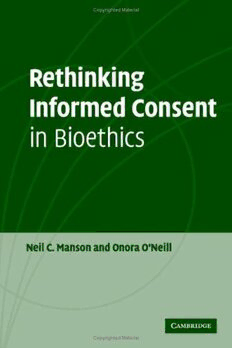Download Rethinking Informed Consent in Bioethics PDF Free - Full Version
Download Rethinking Informed Consent in Bioethics by Neil C. Manson, Onora O'Neill in PDF format completely FREE. No registration required, no payment needed. Get instant access to this valuable resource on PDFdrive.to!
About Rethinking Informed Consent in Bioethics
This is a very good critique of the rationale for and present practice of using informed consent in research and clinical practice. To some extent, this book is a sequel to O'Neill's prior work on bioethics. In her Autonomy and Trust in Bioethics, O'Neill presented a very effective critique of the reliance on the concept of autonomy and the nature of the concept of autonomy used in clinical and research ethics. O'Neill argued well that the reliance on the principle of autonomy was poorly formulated and contributed to erosion of trust. In the present book, O'Neill and Manson provide an effective critique of the conventional informed consent approach and present a conceptual alternative. Manson and O'Neill argue that the present informed consent doctrine exhibits a misplaced emphasis on autonomy, is practically difficult, and leads to neglect of ethically necessary aspects of communication between physicians/researchers and patients/participants. They suggest that the present model is based on a "container" approach to delivering information that has major defects. Manson and O'Neill present a model of informed consent based on a "waiver" of specific obligations and rights and an "agency" model of the consent process which tries to stress the full spectrum of requirements for effective communication. This model is extended to some related issues like data privacy and genetic issues in a rigorous way that produces recommendations at variance with present practice. Manson's and O'Neill's critique is carefully developed and convincing. The major drawback of this book is that it is theoretically strong but the authors' suggestions for concrete changes are quite modest. Regardless, the arguments developed in this book are much more rigorous and well founded than those found in the great majority of the bioethics literature.
Detailed Information
| Author: | Neil C. Manson, Onora O'Neill |
|---|---|
| Publication Year: | 2007 |
| ISBN: | 9780521874588 |
| Pages: | 228 |
| Language: | English |
| File Size: | 0.88 |
| Format: | |
| Price: | FREE |
Safe & Secure Download - No registration required
Why Choose PDFdrive for Your Free Rethinking Informed Consent in Bioethics Download?
- 100% Free: No hidden fees or subscriptions required for one book every day.
- No Registration: Immediate access is available without creating accounts for one book every day.
- Safe and Secure: Clean downloads without malware or viruses
- Multiple Formats: PDF, MOBI, Mpub,... optimized for all devices
- Educational Resource: Supporting knowledge sharing and learning
Frequently Asked Questions
Is it really free to download Rethinking Informed Consent in Bioethics PDF?
Yes, on https://PDFdrive.to you can download Rethinking Informed Consent in Bioethics by Neil C. Manson, Onora O'Neill completely free. We don't require any payment, subscription, or registration to access this PDF file. For 3 books every day.
How can I read Rethinking Informed Consent in Bioethics on my mobile device?
After downloading Rethinking Informed Consent in Bioethics PDF, you can open it with any PDF reader app on your phone or tablet. We recommend using Adobe Acrobat Reader, Apple Books, or Google Play Books for the best reading experience.
Is this the full version of Rethinking Informed Consent in Bioethics?
Yes, this is the complete PDF version of Rethinking Informed Consent in Bioethics by Neil C. Manson, Onora O'Neill. You will be able to read the entire content as in the printed version without missing any pages.
Is it legal to download Rethinking Informed Consent in Bioethics PDF for free?
https://PDFdrive.to provides links to free educational resources available online. We do not store any files on our servers. Please be aware of copyright laws in your country before downloading.
The materials shared are intended for research, educational, and personal use in accordance with fair use principles.

